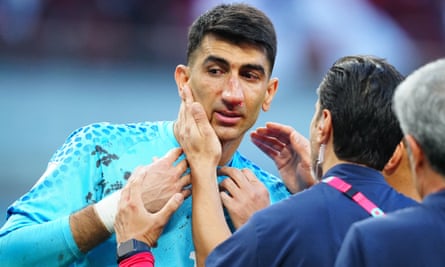Urgent need for temporary concussion substitutes inexplicably ignored by Ifab

Worrying cases of Denis Zakaria, Neco Williams and Alireza Beiranvand illustrate the dangers of football’s current protocols

While he was critical of his own Premier League debut in the wake of Chelsea’s win against Bournemouth last Tuesday, the general consensus in post-match musings across the media were that Denis Zakaria had acquitted himself well. More than a little alarming was the fact that few, if any, of those assessing the Switzerland international’s performance at Stamford Bridge seemed to notice that he should almost certainly have been withdrawn from the field of play when the game was only 20 minutes old.
Helping the hosts defend a corner, Zakaria tracked a run from Kieffer Moore across Chelsea’s penalty area and appeared to whack his head off the Bournemouth striker’s hip as he leaped to challenge for the inswinging delivery to the near post. As Chelsea cleared the ball, Zakaria crumpled to the ground where he lay prone and possibly unconscious for the best part of 90 seconds. Having received treatment from a two-man medical team while his visibly concerned teammates Kepa Arrizabalaga and Kalidou Koulibaly looked on, Zakaria was eventually lifted to his feet looking anything but compos mentis.
Clearly discombobulated, he was helped to the touchline and quickly returned to action, going on to play – and play well – for another hour before being substituted to warm applause from the home support. Having been limited to just two previous playing opportunities since signing on loan from Juventus in September, it was a big night for the 26-year-old midfielder as he attempted to stake his claim for a first-team place; a big night that almost certainly should have ended much earlier.
While Zakaria may not have shown any obvious lasting symptoms of concussion, there is no guarantee he hadn’t suffered one. His apparent loss of consciousness, however brief, provided a clear indication that he almost certainly had. Experts in the field have made it clear one does not have to be knocked out cold to suffer such a brain injury, but lying motionless on the ground for even a few seconds after shipping a blow to the head is a good sign that one has been sustained.
Under the conditions of the Premier League’s additional permanent concussion substitutions trial, Chelsea’s medical staff were left with two options – to perform a fairly basic perfunctory on-field head injury assessment and allow Zakaria to play on, or to remove him permanently from the game and use up one of two concussion substitutes permitted to each team. The second course of action would have meant Bournemouth getting the option of using an additional replacement on top of their allotted five, in order to prevent any suggestions of Chelsea getting an unfair advantage in terms of personnel changes.
The third and eminently most sensible option – that of allowing Chelsea to bring on a temporary substitute while their medical staff brought Zakaria off the pitch and down the tunnel to conduct a more lengthy assessment – was not open to them. In June, the game’s lawmakers, the International Football Association Board (Ifab), inexplicably elected not to proceed with a trial of temporary concussion substitutes, opting instead to focus on the existing trials of additional permanent ones, who are introduced on the rarest of occasions. Only three permanent concussion substitutes were used in the season’s 160 remaining top-flight matches after the introduction of permanent concussion subs in February 2021.
There is no need to go that far back to see how unfit for purpose the current concussion substitution rules can be. During England’s opening World Cup game in Qatar, the Iran goalkeeper Alireza Beiranvand was involved in a nasty collision with his teammate Majid Hosseini. Conscious but visibly shaken, he could scarcely have looked more concussed unless a quintet of cartoon canaries had started cheeping in unison around his head. Despite his obvious distress, Beiranvand was understandably reluctant to leave the pitch because he knew it meant he would be unable to return. He continued playing for several minutes before realising the jig was up and going to ground. Moments later he left the pitch on a stretcher and was replaced.

During England’s match against Wales, Neco Williams shipped a Marcus Rashford piledriver full force to the crown of his head but soldiered on for another 12 minutes before being substituted, despite all available evidence suggesting he was in no fit state to be on the pitch. The decision of the Wales medical team to leave him out there attracted opprobrium from the BBC pundits Chris Sutton and Alan Shearer, among others.
“It has to come,” said Shearer of the reluctance of football’s lawmakers to introduce temporary concussion substitutes. “I would say to Ifab, what an earth are you waiting for? Doctors and physios are trying to buy time. Bring him off and assess him. What are they waiting for? Do it now.” Having undertaken more research than most in the punditocracy on the subject of football-related brain injuries for his 2017 documentary, Alan Shearer: Dementia, Football and Me, the former striker’s audible anger and frustration was entirely understandable.
His one-time Blackburn teammate Sutton is another who is similarly well-placed to comment having lost his father, Mike, also a former professional footballer, to dementia and been a tireless and often frustrated campaigner for the immediate ratification of temporary concussion subs by Ifab. “We don’t need to keep having meetings about meetings about this,” he once told MPs at a digital, culture, media and sport committee inquiry into concussion in sport. “This needs to happen immediately.” Almost two years and several meetings about meetings on from Sutton’s impassioned plea, Ifab has since decided against taking his advice on board.
Defending the decision before the start of the season, Ifab’s CEO, Lukas Brud, argued the fundamental problem in regards to this issue was the current protocols not being properly adhered to. “We can understand the reasons why people are frustrated, but they are expressing frustration about mismanagement of the current protocol,” he said. “If you don’t take a player off, no protocol will help you.”
A few days before Christmas it was revealed that the Premier League, in conjunction with Ligue 1 and MLS, and with the backing of member club doctors, has asked Ifab for permission to adopt the use of temporary concussion substitutes next season and expects to receive an answer in the spring. Given its previous reluctance to facilitate this simple preventive measure, there seems a very good chance Ifab’s answer will be an inexplicable, potentially life-threatening “no”.
- Football
- Sportblog
- Concussion in sport
- comment